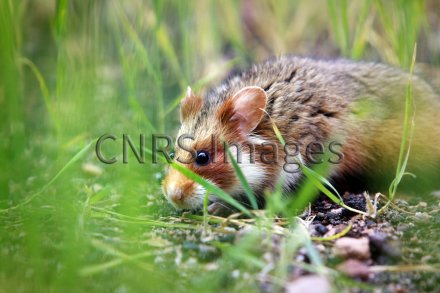Production year
2015

© Nicolas BUSSER / IPHC / CNRS Images
20230092_0001
Hamster d’Europe, "Cricetus cricetus", durant un lâcher dans l'enceinte du fort Joffre, à Holtzheim, en Alsace. Cette espèce décline en France où elle n'est présente qu'en Alsace. La santé des populations dépend fortement des cultures agricoles qui servent pour son habitat et son alimentation, et l'une des causes identifiées de son déclin est la culture intensive des céréales, très développée en Alsace. La reconstitution d'un habitat favorable passe donc par une adaptation des pratiques agricoles. Durant cette étude, le terrain du fort Joffre a été divisé en parcelles cloisonnées pour que les scientifiques puissent comparer l'impact de différentes associations de cultures, d'espèces maraîchères ou adventices (les "mauvaises herbes"), sur la santé et le succès reproducteur des hamsters qui y ont été lâchés.
The use of media visible on the CNRS Images Platform can be granted on request. Any reproduction or representation is forbidden without prior authorization from CNRS Images (except for resources under Creative Commons license).
No modification of an image may be made without the prior consent of CNRS Images.
No use of an image for advertising purposes or distribution to a third party may be made without the prior agreement of CNRS Images.
For more information, please consult our general conditions
2015
Our work is guided by the way scientists question the world around them and we translate their research into images to help people to understand the world better and to awaken their curiosity and wonderment.